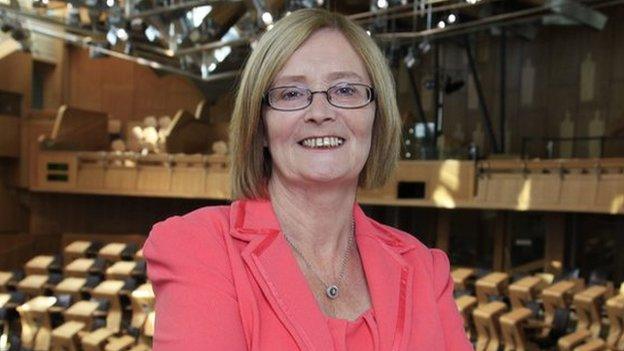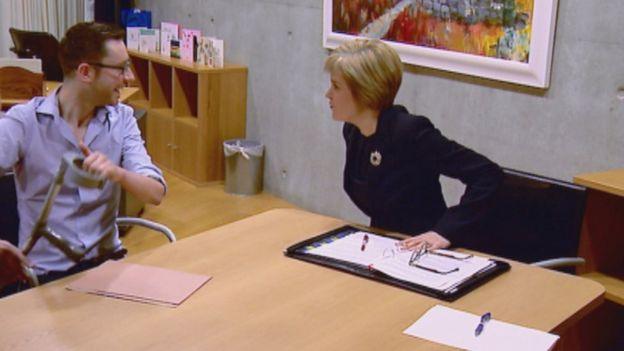FMQs: A temporary wheeshting
- Published

"Wheesht!", exclaimed an exasperated presiding officer. And, lo, they wheeshted. However, it was but a temporary respite.
The dialogue swiftly resumed. And the exchanges between the front benches were decidedly over-prolonged, at least as far as the PO, Tricia Marwick, was concerned.
At the close of questions to the first minister, Ms Marwick apologised to back benchers on the grounds that she had only been able to call one or two of them to contribute. The time available, she sighed, had all been swallowed up by the party leaders.
Perhaps it was frustration over that which led Ms Marwick to utter her admonition to the chamber, urging silence. Perhaps she was simply fed up with the level of heckling which appeared particularly voluminous.
The reason for that is not hard to discern. The closer we get to the elections in May, the louder the rhetoric. There should be a formula to calculate this - where x represents the number of weeks to go and y the seeming SNP lead in the polls. Differentiate one, square the other and you get z, the Holyrood volume. We could call it Marwick's Law.

Tricia Marwick was concerned about party leaders swallowing up time at FMQs
However, it was a complex formula of another kind which preoccupied the front benches, leading to those lengthy exchanges which so infuriated the PO. That formula - familiar in political debate - concerned the relationship between the amount of cash put into the public sector and the benefit derived.
Labour's Kezia Dugdale sounded genuinely indignant as she tackled the topic of local authority cuts. That was undoubtedly because she chose as her conduit to this subject the most sensitive aspect of all.
Ms Dugdale began by calling upon the first minister to redeem her pledge to Gordon Aikman that the number of specialist motor neurone disease nurses in Scotland would be doubled. (Mr Aikman, you will recall, is a Labour activist who has turned his personal MND tragedy into a campaign.)
Care package
Nicola Sturgeon said her admiration for Mr Aikman and his campaign knew no bounds. She said she had already guaranteed that the relevant funds were in place; that the remaining issue was recruiting suitably qualified staff.
The problem, in short, did not lie with funding. However, Ms Dugdale had more. She noted that information obtained by Mr Aikman disclosed the level of mortality among vulnerable people waiting for a care package to be put in place. How, she queried, would £500m of cuts to council funding alleviate that problem?
It was, in itself, cogent and effective. But Ms Sturgeon, as you would expect, was ready for the attack. Her government had transferred £250m to councils to promulgate the integration of health and social care. That was in addition to recurring funding.

Nicola Sturgeon told Gordon Aikman a year ago that the number of specialist MND nurses in Scotland would be doubled
Ms Dugdale persisted. How about a living wage for care workers? The Labour leader said the SNP stood ready to find money to cut Air Passenger Duty, to the benefit of airlines. Why not find cash for carers?
This was too much for the FM. The "last vestiges of credibility" had disappeared, she said. Labour, she declared, had now pledged to spend the APD money - which did not feature in the current budget - in four different ways: education, then reinstating tax credits, then helping first time house buyers and now the living wage.
Ms Sturgeon suggested, with decided vigour, that her opponents had a duty to produce a costed, cogent alternative to the Scottish government's budget.
A substantive attack, with a substantive rebuttal. But all taking too much time, according to the PO.
Willie Rennie of the Liberal Democrats arrived more speedily at his point. But then he is constrained in the number of questions he is permitted to ask which, on occasion, can be an advantage.
Mr Rennie raised the topic of the proposed 18% tax hike in Moray, breaching the Scottish government freeze. The Lib Dem leader said even a £1 increase sanctioned in Elgin would be met with a £1m penalty ordered from Edinburgh. A "double whammy", he said.
Cold disdain
Customarily, Mr Rennie's remarks are met with anger or cold disdain from the FM. On this occasion, she opted for a rebuke which sounded simultaneously stern and disappointed, as if delivered to a truculent infant.
There was no "penalty", as described by Mr Rennie. Rather, councils were compensated for sustaining a council tax freeze. If they opted to end the freeze, then the subsidy ended.
A little earlier, Ruth Davidson had essayed a few lessons of her own. The Tory leader wanted Ms Sturgeon to adopt a scheme known as Teach First which recruited bright young graduates and diverted them to classrooms in challenging areas.
But not, as yet, in Scotland. Indeed, said Ms Davidson, Scots graduates were joining the scheme - to teach in England.
On the subject of schools, Ms Sturgeon tends to tread warily. She knows that the record is not consistently Grade A. The days of proclaiming that Scottish education was the best in the world are now consigned to history, along with syntax and the dominie.
The FM knows that there are political risks in sounding too dismissive of alternative ideas, as regularly and enthusiastically advanced by Ms Davidson.
So she stressed again that she was potentially open to all ideas - that could be shown to work. That did not, in her view, apply to the Teach First notion advanced by the Tory leader.
Still, there will be other days, other debates - and other opportunities for intellectual and political discourse. But, if Tricia Marwick has her way, those exchanges will be rather more truncated.
- Published12 January 2016

- Published11 January 2016

- Published12 January 2016
